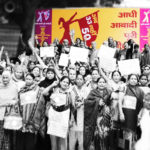There is a growing consensus amongst the people across the world when it comes to representation and why equal representation is a necessity. Living in a democratic country, what should be obvious is that democracies constantly shift and evolve into better structures of equalities in accordance with changing times and requirements of its citizens. This change constitutes the various events in our history that have led us to this year.
There is also a growing consensus amongst the people of this country when it comes to inequality between men and women, restrictive gender roles, misrepresentation of various idenities and how we still largely live in a male-dominated, male-oriented and male-made country.
The question of representation is something that has been constantly brought up, shrugged upon and challenged with ‘women have always have the right to vote what more do you want’. Yes, our constitution establishes a parliamentary system of government and guarantees its citizens the right to be elected, freedom of speech, freedom to assemble and vote, but do we actually encourage women to come out and exercise these rights? In 1993, when a constitutional amendment was passed in India that called for a random one third of Sarpanch position to be reserved for women, the plan was to extend this reservation to parliament and legislative assemblies. The Rajya Sabha passed the bill on 9th March, 2010. The Lok Sabha never even voted on the bill and so the bill is still pending.
The problem is not just equal representation in the Parliament, the problem is how do we shift the mind-set of our highly regressive society to ensure that women can safely exercise the rights that our democracy has reserved for its citizens? The fight for equal representation is not just political, it’s equality in everything.
Do we treat girls and boys the same way? No. Read: Female Foeticide
Do we educate girls and boys the same way? No. Read: Child Marriage, Domestic Help, Poverty
Do we pay women and men the same? No. Gender-Wage Gap, Unequal Opportunities, Preference of male workers over female workers. Family. Childbirth.
Do we provide women and men with the same medical facilities? No. Preference to get the male treated before women. Gendered access to medication.
Do we see the amount of women and men in public spaces? No. Eve-teasing. Molestation. Rape. Abduction. Murder. Public violence against women.
Do we have equal number of men and women making laws? No.
Do we have equal number of men and women making laws about women’s rights and violence against women? No.
When the world was astonished over their (male) elected representatives making laws about abortions, the one thing that women’s rights activists were urging everyone to understand is that the fundamental problem is we have men making laws about women’s bodies. Bodies they don’t have, haven’t experienced, can never even presume to know the nuances of, but can presume the position of violence over these bodies.
When the world is astonished over the horrifying rape cases that India has seen in the past month, the question is how do we even presume to change the law when the men who decide do not even understand rape? Do not understand the power-dynamics behind rape, the domination that the male assumes is his over the female? Do our representatives even understand what is means to be a body that is always wanted as objects of domination? At home, at parks, in buses, at a friends, in office, in washrooms, in schools, in colleges? Women are always, always vulnerable because men are always told, taught, see, believe that they have access to them.
The problem with unequal representation, and why is the biggest fight that needs to be fought till it becomes a reality in our country, is the fact that we don’t have women making these laws. We don’t have women in positions of power, we have a statistic by the National Records Bureau that states 71% of rape cases go unreported. We see that the conviction rate from 44.3% in 1973 has fallen to 27.1% in 2013. We have rape as the fourth most common crime against women in India, and we’ve had a history of burning women, remember.
When we have a lack of women representation, we have an overwhelming male panel who women gravitate to but are always disappointed by. We’re essentially living in a horror movie right now and everytime we think the male leadership is drawing stricter rules, stricter surveillance and stricter supervision, we get a sequel of the last horror movie. There has to be a point when the people of this country understand that we’re living in a hellish state where women are being handed weapons of security. Where rape is being used a tool of regression and infantilisation and forcing women to stay in their homes. Let’s not even talk about marital rape because we’re too ignorant to understand that marriage doesn’t equate to consent automatically.
There has to be a point where we understand that the problem of women’s right is a problem of human rights. At this point, we’ve seen the video of a man shooting a woman in the face in front of a 100 people. At this point, we know that men have looked up Priyanka Reddy on porn sites. At this point, we know that the problem is not women. At this point, we need to stop saying don’t get rape and start saying don’t rape. Just stop, stop raping. We need women in positions of power trying to steer this democracy into a positive change and not regression.





